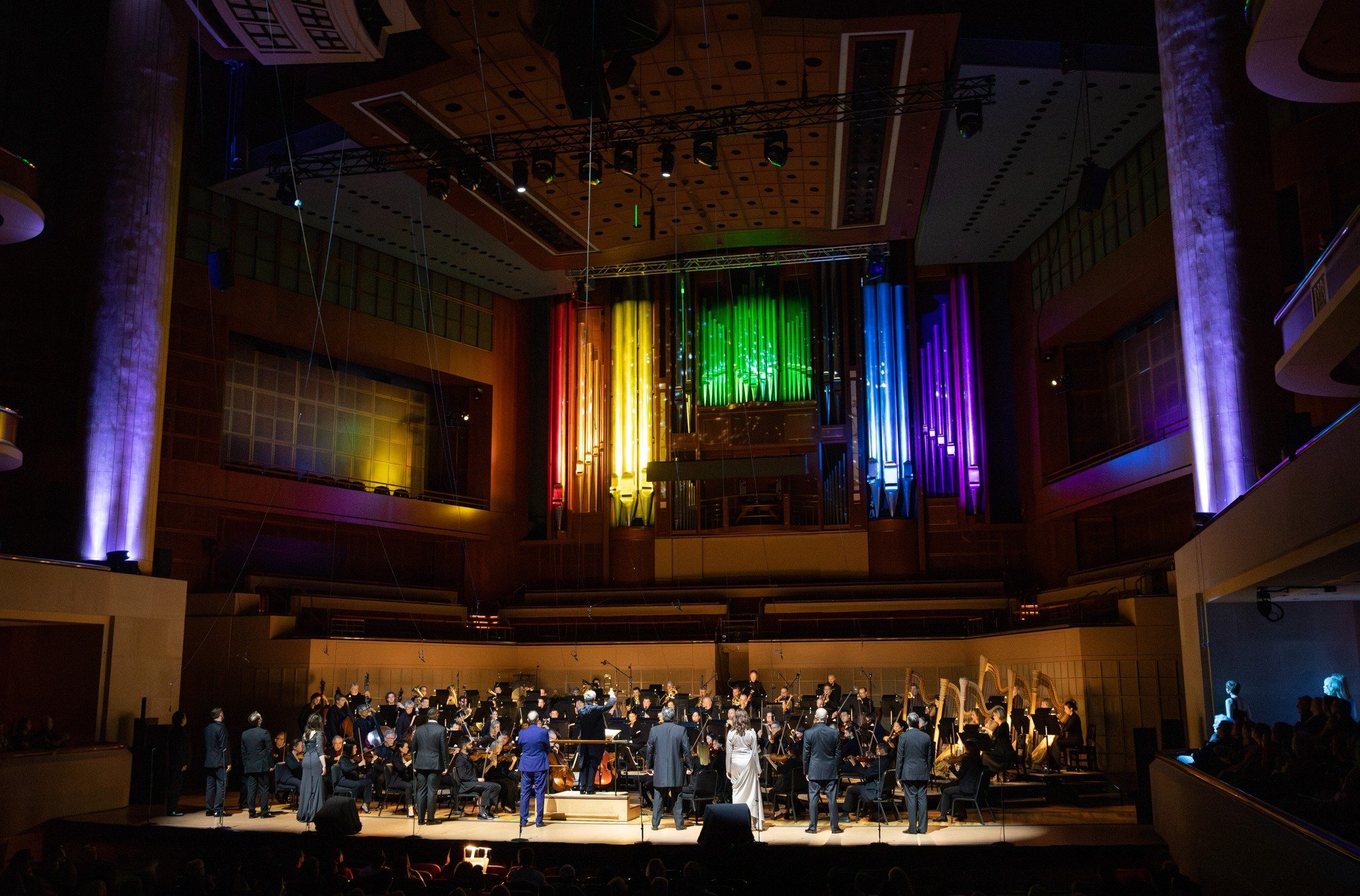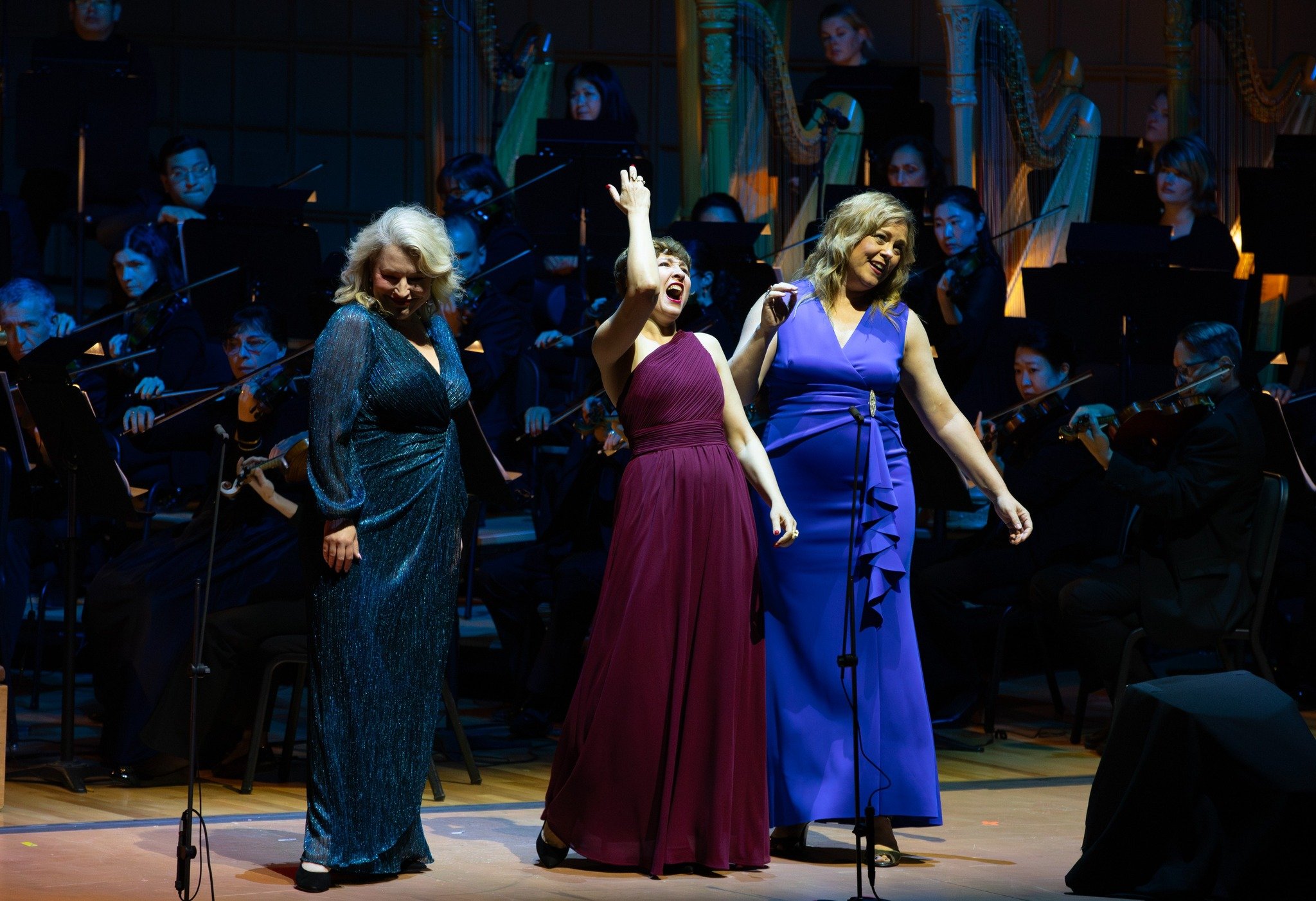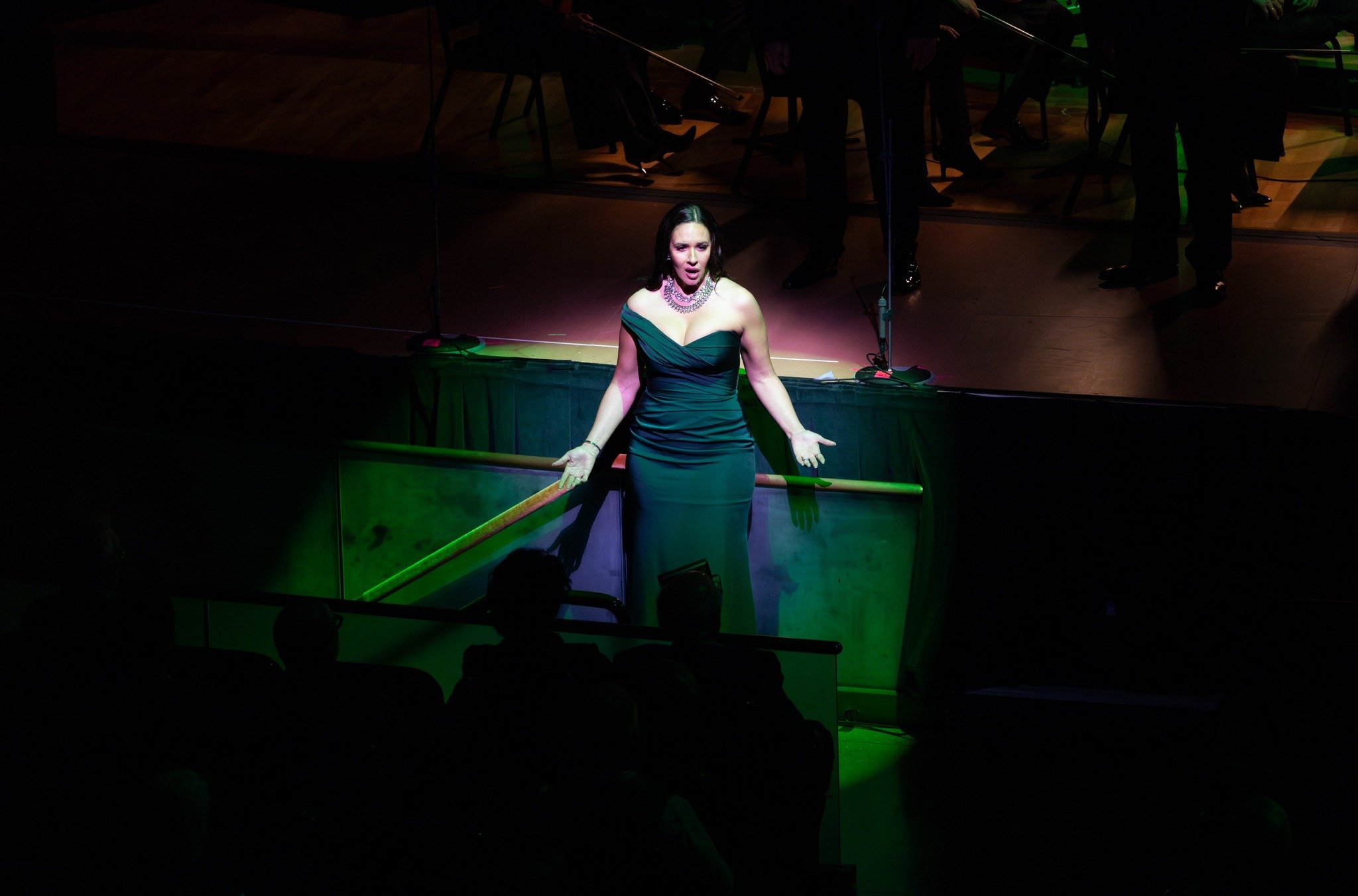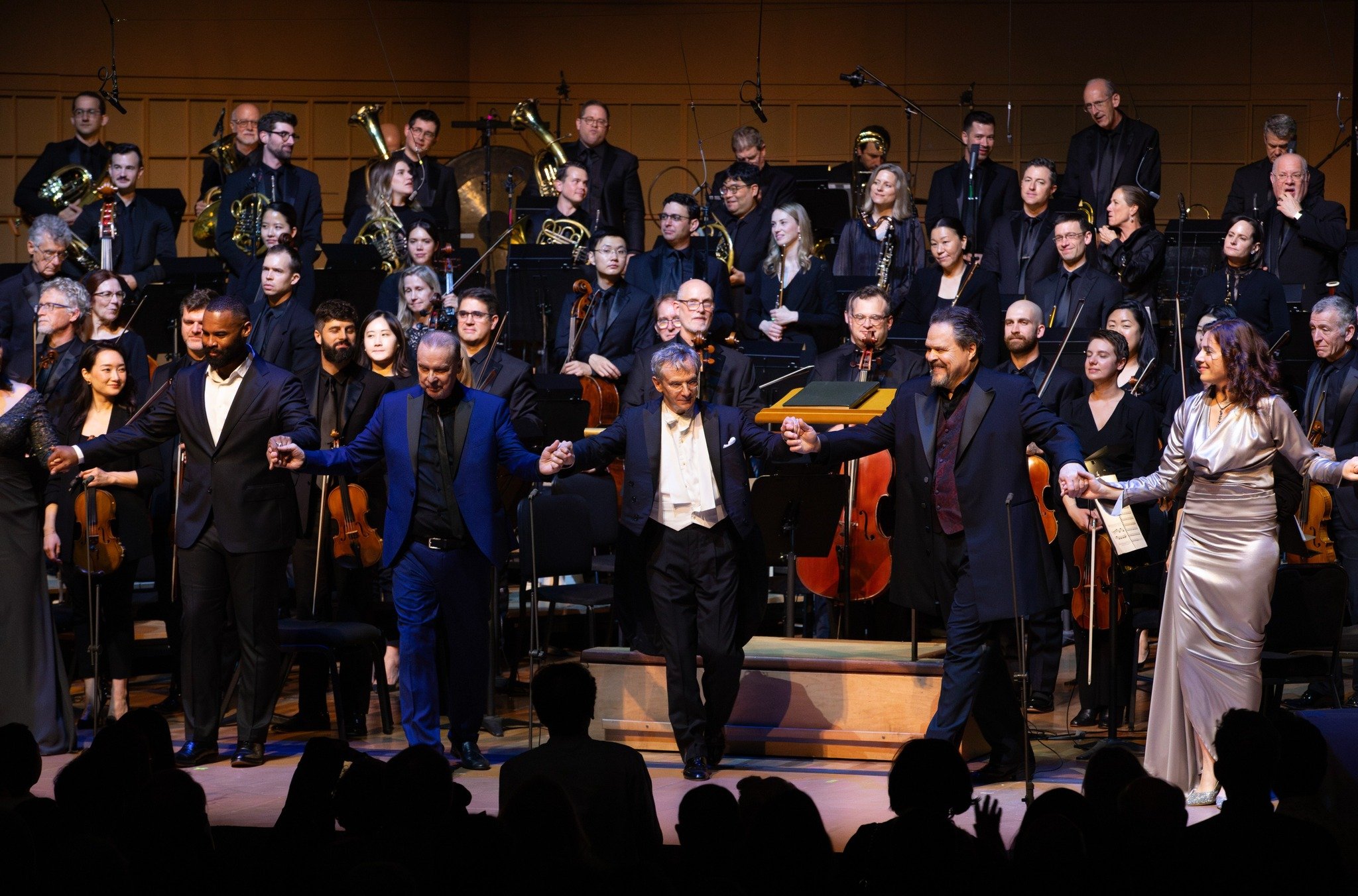Wagner’s ‘Der Ring’ in concert @ Dallas Symphony Orchestra
Photos by Sylvia Elzafon
—Wayne Lee Gay
The Dallas Symphony and music director Fabio Luisi launch an ambitious concert version of Richard Wagner's Der Ring des Nibelungen (The Ring of the Nibelung) this week with the first two operas of that four-opera cycle. The remaining two operas will be presented in October, followed by a complete concert performance of all four operas of the cycle spread over a period of one week, also in October.
Concert performances of an opera, with singers and orchestra sharing the stage, minimal sets, and varying degrees of costuming, are an unusual beast. On the plus side, such performances allow a focus on the music rather than costumes and scenery. Obviously less costly than fully staged performances, concert versions also permit exploration of works that might be too risky or expensive otherwise. On the negative side, a concert version obviously contradicts the composer's intent for a fully visualized performance with costumes and scenery.
As for the Ring cycle, the Dallas Symphony's next-door neighbor, The Dallas Opera, has presented each opera in staged versions separately through the years; clearly, conductor Luisi at the Symphony wants to create the experience of the Ring cycle as a unified experience in a relatively short time span.
Interestingly, there has been a sudden abundance of concert versions of operas in the North Texas region; Fort Worth Opera presented a semi-staged version of Puccini's La boheme early in April, and the Fort Worth Symphony performed a concert version of Act I of Die Walküre a few weeks later. The FWSO will also present a concert version of Wagner's Der fliegende Holländer (The Flying Dutchman) in April 2025. It remains to be seen whether presenting concert versions of operas is a fad or a trend in these parts.
The current version from the DSO opened Wednesday with Das Rheingold (The Rhinegold), followed Thursday with Die Walküre (The Valkyrie). Thursday night's performance of Die Walküre began at 6 pm and ended at about 11:15; having misread my ticket, I missed the first seventy-minute act. Das Rheingold will repeat Saturday night and Die Walkúre will follow on Sunday afternoon.
Virtually all aspects of any production—staged or concert—of Wagner's operas are demanding, and this version meets those demands handsomely. Under Luisi, the Dallas Symphony (expanded to meet Wagner's penchant for large orchestra) performs with relentless energy and near perfection. And Luisi's desire to present the work with the Dallas Symphony is clearly justified by the constant energy and sense of momentum with which he shepherds the ensemble and they respond, still as fresh at the end of the second opera as in the extended orchestral introduction the day before.
Stage director Alberto Triola moves the various singers across the limited space convincingly. Here, the male singers wear black, quasi-formal business suits and tuxedos; female singers wear gorgeous formal attire. Several productions of the late twentieth-century set the Ring operas in corporate offices, underlining the recurrent themes of greed and power, and this version certainly moves in that direction with this upscale concert attire.
Much of the success of the production comes from Krista Billings' lighting design, which uses the grandeur of the Meyerson Symphony Center (and, in particular, the towering pipes of the hall's organ) as a palette for various shades and moods. Use of the organ as a stand-in for Valhalla, the palace of the gods, proves particularly effective.
Wagner made extraordinary demands on his singers, requiring rich vocal timbres, remarkable stamina, and wide, expressive ranges. Here, the fourteen singers required for Das Rheingold meet the requirements impressively. All of the characters in this opening opera are gods, immortals, or giants drawn from Nordic mythology—with some elements of the human-like characteristics of greed and petty jealousy. Bass-baritone Mark Delavan as Wotan, the ruler of the gods, successfully carries much of the load in Das Rheingold, along with mezzo-soprano Deniz Uzun as his wife Fricka, the guardian of home and marriage.
Baritone Tómas Tómasson provides a frighteningly evil and vocally perfect Alberich; tenor Štefan Margita steals the spotlight—as is often the case with the role of Loge—portraying the clever fire-spirit as a sort of corporate henchman. Contralto Tamara Mumford appears late in Das Rgeingold, seeming to rise out of nowhere as Erda, the earth goddess, with a hypnotically beautiful voice.
Bass-baritone Delavan and mezzo-soprano Uzun return in Die Walküre in their roles as Wotan and Fricka, continuing to demonstrate remarkable Wagnerian musicality and almost unbelievable stamina. The central element here is the tragic (and incestuous) love affair of the mortals Sieglinde and Siegmund, established in Act I. In those roles, soprano Sara Jakubiak and tenor Christopher Ventris display fine vocal subtlety as well as Wagnerian power when they return for their final scene together in Act II, breathing human emotion and texture into this monumental episode.
Soprano Lise Lindstrom literally leaps onto the stage to deliver her glorious first note as Brunnhilde, the valkyrie of the title, providing one of the most memorable moments of Die Walküre. She matches this later in her (briefly unaccompanied) lament in Act III. The arrival of her band of valkyrie sisters for the famous "Ride of the Valkyries" showcases eight glorious Wagnerian female singers (all attired magnificently in modern formal wear rather than the traditional helmets and spears), singing at full force against the roaring symphonic accompaniment.
While the Meyerson organ serves as a stand-in for Valhalla in Das Rheingold, it glistens in a light show in the final moments of Die Walküre, evoking the flames that encircle the spell-imprisoned Brunnhilde. This one last lighting effect, an enhancement to the magnificent musical performance, brings the eight-hour-long, two-opera set to a breathtaking close.
WHEN: May 1-5, 2024 (Saturday and Sunday repeat performances)
WHERE: Meyerson Symphony Center, Arts District, Dallas
WEB: dallassymphony.org



